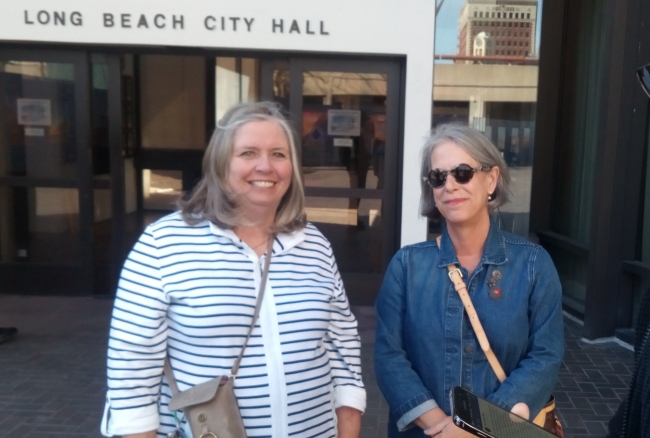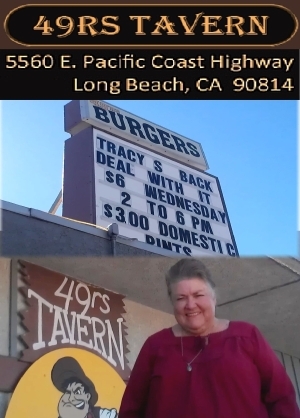The Senator's amendments are mainly non-responsive to objections to SB 827 raised by Councilmembers Stacy Mungo, joined by Councilmembers Al Austin and Daryl Supernaw who agendized a Feb. 13 Council item, (LBREPORT.com coverage here) that called SB 827 a usurpation of local restrictions and proposed that the City of Long Beach oppose the bill. However at the Feb. 13 Council meeting, lead-agendizer Mungo said "we" (didn't say who) had received a letter to Senator Wiener and a call earlier that day (Feb. 13) and (Mungo said) the Senator had "agreed" to make unspecified "changes" to his bill. Mungo acknowledged she didn't know what the changes would be but called the development a "step in the right direction" and said Sen. Wiener's contact with the City shows that Long Beach is a player in this state and on legislative matters.
Councilman Austin [who said last year he's considering a run for state Senate seat that may open later this year] said he'd received the phone call from the Senator and recommended that the Council refer the issue of SB 827 to the Council's "State Legislation Committee" (chaired by Austin) to await Sen. Wiener's then-unspecified amendments, saying the Council action would show "good faith"...and the Council did so.
A few hours before the Feb. 13 City Council meeting, 3rd district Council candidate Gordana Kajer and 5th district Council candidate Corliss Lee held a press availability outside City Hall to urge Councilmembers to do more than oppose SB 827 and said the Council should also seek amendments to SB 35 (authored by Senator Wiener, enacted in 2017) to restore aspects of local land use/housing decision making and the public's CEQA rights that SB 35 erased or curtailed.

Council candidates Corliss Lee (left) and Gordana Kajer (right)
Ms. Kajer and Ms. Lee noted that SB 35 as enacted and SB 827 as proposed could impact city staff's proposed Land Use Element (LUE) density increases, currently scheduled to come to the City Council on March 6 for a decision on density-increase maps. A number of Councilmembers (including Mungo) have urged "tweaks" in the maps, while Council candidates Kajer and Lee have urged that the Council pause the LUE's advance until the impacts of SB 35 (and a number of other 2017 Sacramento housing/land use related bills) had been fully discussed.
Sponsor | Sponsor |
Below are the February 27 amendments to SB 827 as summarized by Senator Wiener:
[Accompanying Sen. Wiener Feb. 27 release text]SUMMARY OF FEBRUARY 2018 AMENDMENTS
1. Locally adopted mandatory inclusionary housing requirements shall apply to SB 827 projects. Additionally, voluntary programs that grant zoning bonuses and waivers for different levels of affordable housing based on proximity to bus and rail transit, such as the Transit Oriented Communities Guidelines in Los Angeles, shall dictate affordability requirements based on the final design of the building.
2. Ban on demolishing rent-controlled housing units. Rent-controlled housing may not be considered for demolition permits unless a local government certifies by resolution, after the passage of SB 827, that the city will consider demolition permits for rent-controlled housing based on criteria and processes set forth in the resolution, and affirm that every displaced tenant will have a Right to Remain Guarantee (#4). After the resolution passes, the city retains full discretion to deny, restrict, or limit issuance of these permits in accordance with its policy.
3. All local processes for evaluating demolition permits shall apply to SB 827 projects. These local processes may include reviews through a Planning Commission or City Council, or even be categorical bans on certain types of demolition. Additionally, a demolition permit may not be issued for an SB 827 project until an adequate Right to Remain Guarantee for all displaced tenants -- regardless of whether the housing was rent-controlled or not -- has been approved by the local government.
4. An adequate Right to Remain Guarantee -- at minimum -- must include a developer providing to all displaced tenants:
- a. Moving expenses for moving into, and out of, an interim unit in the area.
- b. Up to 42 months of rental assistance for the price of an available, comparable unit in the area.
- c. A right of first refusal for a comparable housing unit in the new building, and offered with a new lease at the rent previously enjoyed by the tenant in their demolished unit.
5. Local setback and yard requirements will remain enforceable as long as the SB 827 building is permitted to occupy a reasonable amount of the lot area. This will be measured in minimum floor area ratio requirements established in SB 827 for the different height tiers, and be comparable to 50-60% of the lot area.
6. Projects seeking a Transit-Rich Housing Bonus through SB 827 may also, concurrently, seek a State Density Bonus. The waivers and concessions for the State Density bonus shall be calculated using SB 827 criteria as base development standards.
7. Transit-rich projects will qualify within ¼ mile of a high-quality transit stop on a corridor -- not the corridor itself. A parcel must be within ¼ mile of a stop on a high-frequency bus line or ½ mile of a major transit stop in order to qualify for SB 827.
8. Street width is measured from property line to property line ("right of way") instead of curb-to-curb. A street shall be considered subject to higher height tiers if there is a >70ft right of way.
9. Parcels in zoning districts permissive to residential development may use SB 827. In most communities, this includes residential and residential mixed-use zoning districts. A site adjacent to transit that is currently zoned exclusively for industrial use would not be able to use SB 827.
10. SB 827 projects will be protected by the Housing Accountability Act and may be eligible for SB 35 streamlining. For the purpose determining eligibility for these laws, SB 827 projects shall be considered "compliant with local zoning."
Sponsor |  |
In accompanying release text, Senator Wiener says his amendments are part of what he calls a "Housing First" package that will also include SB 828 "to reform the Regional Housing Needs Assessment (RHNA) process" [requiring entities such as the So. Cal. Ass'n of Governments (SCGA) to rely solely on "objective data" and make appeals of SCAG's RHNA numbers by cities, like Long Beach, more difficult.]
Senator Wiener states: "These amendments are a great first step in strengthening our effort to address our housing shortage by allowing more people to live near public transportation...Explosive housing costs and displacement harm our environment, our economy, and our residents who can't afford to live near their families and their jobs. We must build more homes at all income levels. These amendments resulted from some great discussions about how to meet the goals of SB 827, while ensuring tenants and local communities have strong protections, and that local governments working to create more housing are able to do so. I will continue to work with a broad range of voices to make the bill as good as it can be."
[Wiener release text] The amendments make explicit that local demolition controls remain intact, which means if a local government bans demolition of any kind, that demolition is still banned under SB 827. In addition, if a local community places restrictions on demolitions - for example, requiring approval by the local Planning Commission - that approval process and those limits will remain in place. This deference to local demolition controls was previously implicit in the bill, but the new language makes explicit that these controls remain.Also, if local governments do allow for demolition, any demolition approval can only be made for SB 827 projects if all existing tenants are guaranteed a Right to Remain. This Right to Remain Guarantee must, at minimum, include that the developer pay for both moving expenses and rental assistance on a similar unit for up to 42 months to ensure tenants never pay more out-of-pocket than their original rent, and that the tenant has the right of first refusal in the new development at the rent they were paying in their original unit.
In addition, SB 827 bans the demolition of rent-controlled housing, unless a local city council affirmatively certifies via resolution that it intends to review demolition permits for rent-controlled housing, outlines the process by which those reviews will occur, and affirms that any demolition permit issued have a Right to Return Guarantee for displaced tenants. The bill thus creates heightened demolition protections for rent-controlled units and clearly spells out tenant protections.
The amendments also make explicit that SB 827 defers to and keeps fully intact local inclusionary housing requirements - i.e., where cities require that a certain percentage of units in a development be affordable to lower income people - including local programs that may be voluntary but meet the goals of SB 827. This amendment allows effective local programs like the transit-oriented density/affordability provisions implemented under Measure JJJ in Los Angeles to work in parallel with SB 827 by still requiring locally-designed affordable housing requirements in exchange for upzoning benefits. SB 827 will still apply to any parcels near transit that do not fall under the local program.
The amendments also clarify other issues, including around definition of a transit corridor (specifically, that the quarter mile is measured around bus *stops*, not areas in between bus stops), local setback requirements, and interactions with State Density Bonus law.
Sponsor | Sponsor |
First to speak during the Council session was Councilwoman Mungo (a Republican), who said "we" (didn't say who) had received a call earlier that day (Feb. 13) from Senator Wiener who had "agreed" to make "changes" but said she didn't know what the changes would be (as the Senator "has not opened the door on that yet.") Councilwoman Mungo said she appreciates that the work has been communicated and called it a "step in the right direction" and said she'd wait to hear from her colleagues deciding whether to hear the amendments or making a firm disapproval immediately with the option to reconsider if the amendments were appropriate.
Councilman Austin (a Democrat who chairs the Council's "state legislation committee" and has indicated he's considering seeking a state Senate seat that may open up after November 2018 elections) said he had a letter from Senator Wiener asking the Council to hold over a decision until he can make amendments to SB 827. Councilman Austin said Senator Wiener anticipates making "significant amendments" to SB 827 bill in late February (but likewise didn't say what they were) and said Senator Wiener had asked the City Council for more time.
Councilman Austin said that in his telephone conversation with Senator Wiener, the Senator was emphatic in indicating that he's heard not only from the City of Long Beach but many other cities throughout the state and Councilman Austin said "local control is something we're extremely interested in." Councilman Austin recommended that the Council wait in "good faith" for Sen. Wiener to make his amendments and refer the issue of the City's position on SB 827 to the Council's state legislation committee (that Austin chairs).
Councilman Supernaw waved a copy of the letter from Senator Wiener but didn't quote from it.
Prior to the Council vote, Councilman Austin said he'd heard from his constituents on the issue. [LBREPORT.com reported SB 827 the day after it was introduced and has published follow-up stories on SB 827, coverage that other LB media outlets haven't provided.] Councilwoman Mungo said Sen. Wiener's contact with the City shows LB is a player in this state and on legislative matters. Incumbent Mungo (currently facing three opponents in her bid for a second term) she said she would make Senator Wiener's letter available in her next newsletter to her constituents...
During Council discussion, LB Councilwoman Jeannine Pearce said that in addition to local control, she is concerned about the lack of affordability and community benefits lacking in the bill.
LBREPORT.com obtained the text of Sen. Wiener's Feb. 13 letter and published it on Feb. 14. In his letter, Sen. Wiener stated:
I learned today that the Council is considering a resolution to oppose SB 827, my bill allowing more housing near public transportation. Currently, due to low density zoning near transit, people are being forced to drive and pushed into long commutes. This lack of access to transit increases carbon emissions.In any event, I am currently working on amendments to the bill and anticipate introducing those amendments in late February. I respectfully suggest that the Council delay consideration [sic] the opposition resolution until the bill is amended. I am happy to work with Long Beach to determine what common ground may exist. If, after our amendments, the Council determines that it wishes to oppose the bill, I will absolutely respect that position, our disagreement notwithstanding. Thank you for taking the time to review this letter and consider my request
Prior to the amendments, SB 827 encountered stiff opposition from (among others) L.A. City Councilman Paul Koretz (saying it would harm historic single family neighborhoods), the League of CA Cities (arguing it would undermine local control) and a number of usually left-of-center groups and elected officials (including Berkeley's Mayor) who've charged it would encourage gentrification and fails to address affordability. The Mungo-Austin-Supernaw agendized item focused on the bill's impacts on local decision making control.
As previously reported by LBREPORT.com, despite general policies in City Hall's 2017 "state legislative agenda" that recited the City would oppose legislation weakening or restricting local control, the City of LB didn't oppose SB 35 as it advanced to passage. Instead, the City remained officially "neutral"/"working with the author" on "local control" aspects and during this period, the Council's "state legislation committee" (Austin, Mungo and Gonzalez) didn't meet from Jan. 10, 2017 until November 21, 2017 (as SB 35 advanced to passage by mid-September.)
Also during this period, any Councilmembers) could have agendized SB 35 for opposition...but none did. SB 35 received "yes" votes from LB area state Senators Ricardo Lara (D, LB-Huntington Park) and Janet Nguyen (R, SE LB-West OC) and Assembly Speaker Anthony Rendon (D, NLB-Lakewood-Paramount); Assemblyman Patrick O'Donnell was one of a handful of Democrats voting "no" on SB 35. .
Mayor Garcia was absent from the Feb. 13 Council meeting. He chose to attend a meeting of the L.A. County Democratic Party at which local and regional political endorsement recommendations were made.
[LBREPORT.com comment: The meeting was held at the Los Angeles office of United Teachers Los Angeles, roughly two blocks from a Wilshire Blvd. Metro station. We don't believe Mayor Garcia, a Metro Boardmember, used nearby public transit via the Metro Blue Line from Long Beach to attend the meeting.]
blog comments powered by Disqus
Recommend LBREPORT.com to your Facebook friends:
Follow LBReport.com with:
RSS |
Contact us: mail@LBReport.com





Hardwood Floor Specialists
Call (562) 422-2800 or (714) 836-7050
